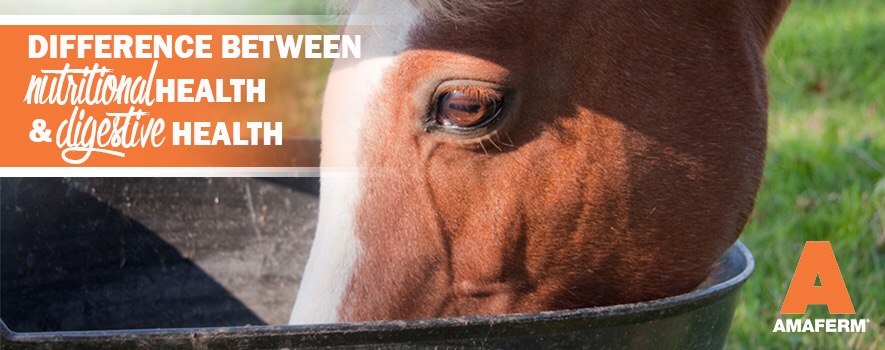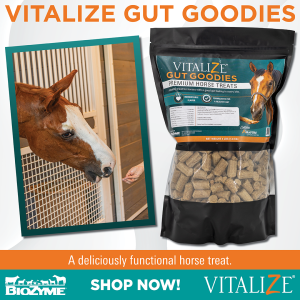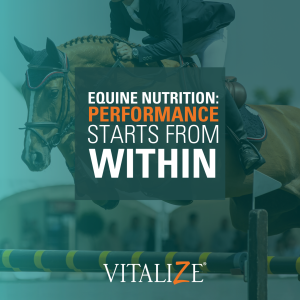A healthy horse is the key to just about every goal its owner has for it, which is impacted by both nutrition and digestion. Without a healthy digestive system a horse’s nutritional health will be compromised no matter how hard we work at feeding them “right”. Without proper nutrition, a horse’s digestive health will ultimately be upset no matter how many digestive supplements we feed.
In order to understand how important digestive health is to a horse’s overall performance, you need to understand the basics of how the horse’s digestive system works and how many places there are for a problem to occur:
- Step 1: Chewing of Feed – chewing produces saliva, which further breaks down food and buffers the acids in the stomach.
- Step 2: Breakdown of Feed in the Stomach – further physical breakdown of feed before it hits the small intestine happens in the stomach. This is where nutrient absorption begins.
- Step 3: Absorption of Feed in the Small Intestine – the partially digested food from the stomach passes into the small intestine, where enzymes act on it to produce materials that can be absorbed into the bloodstream.
- Step 4: Fermentation & Energy Production in the Hindgut – microbial fermentation in the hindgut by billions of microorganisms (bacteria, fungi and protozoa) breaks down the plants that horses eat to produce the volatile fatty acids that are absorbed into the bloodstream to provide energy for the horse.
Because this digestive system is complicated and highly sensitive, managing the diet is extremely important. A horse must have a balanced diet, which includes all the essential nutrients in total and in the proper proportion. It is important to recognize that there are requirements for six basic nutrient categories: carbohydrate, protein, fat, vitamins, minerals and water. These requirements differ from individual to individual and are influenced by the horse’s body mass, age, workload and metabolic efficiency.
So is digestive health or nutritional health more important? Many of the horse feeds that are on the market today contain the proper balance of those basic nutrients needed by the horse, such that nutritional health is almost a given if you choose to feed one of those. Because of this, feeding a nutritional supplement is not always necessary; however, one should certainly make sure their horse’s diet is providing all the nutrients needed. If not, adding a nutritional supplement is a good game plan.
Almost all horses could use a little help with digestive health no matter what they are being fed. Making sure that a horse absorbs all the nutrients they are eating, as opposed to not absorbing them due to a compromised digestive system is a no brainer. Accomplishing this is possible by adding a digestive health supplement to your feeding regimen.
If you want to examine your feeding program more closely, the most in-depth listing of requirements can be found in the Nutrient Requirements for Horses 6th Edition, 2006. This resource is based on scientific research and is updated periodically to stay current with recent findings. This website allows you to select the age, weight, status and workload of a particular horse (under “Animal Specifications”) and determine its specific nutritional needs for macronutrients (given in the table at the bottom of the web page) as well as vitamin and mineral needs (under “Other Nutrients”). This program also allows you to select certain forages and other feedstuffs (under “Dietary Supply” — click on “New” to change feedstuff) to determine how much of your horse’s requirements are being met by a particular feed or combination of feeds (you must input the weight of each feedstuff being consumed).


